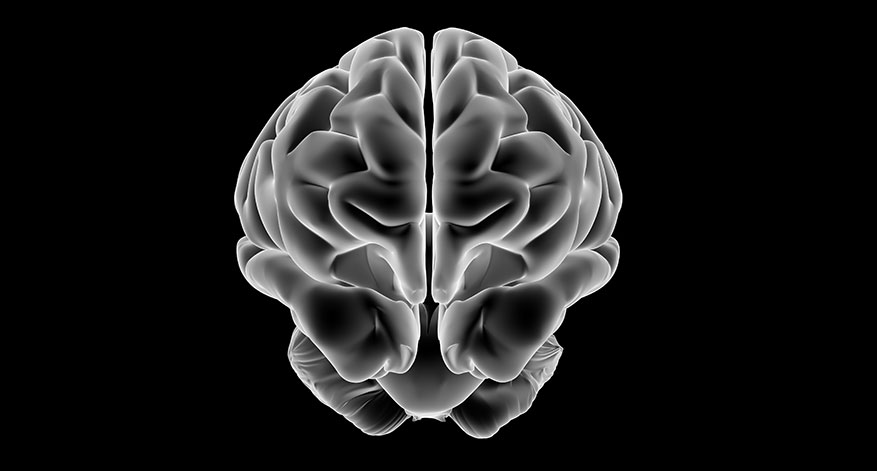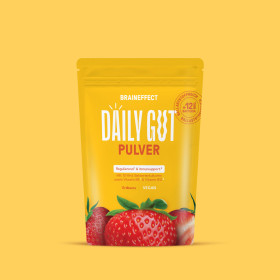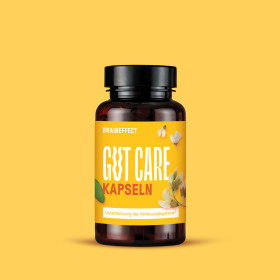
Lack of Concentration
Concentration is essential to be successful at work or in sports. With your head and your mindset everything stands and falls. That's why it's so ultra important to know what you can do to improve your focus and memory. We will tell you all the hacks and tricks on the subject. Get started!

Concentration is essential to be successful at work or in sports. With your head and your mindset everything stands and falls. That's why it's so ultra important to know what you can do to improve your focus and memory. We will tell you all the hacks and tricks on the subject. Get started!
Table of content
1. Mental Performance – the key to success
What could you achieve if you were always 100% focused? If you could call up information in seconds and at will, remember facts and figures better and show off a strong memory?
Concentration, a razor-sharp focus, and a good memory are the key to success - but unfortunately, not everyone can concentrate equally well and the ability to remember varies from person to person. You surely know from your own experience that to focus all your attention on one goal, not to be distracted and thereby solve a task, feels extremely good, and yet it is so difficult.
Not only biohackers like you are one have made it their goal to extend their own concentration span and get into the flow, i.e. into the absolute creative frenzy. For students, office athletes, and everyday heroes, mental performance is also crucial for achieving their goals.

2. Saving information − How does your brain work?
To understand how concentration and the storage of information is actually possible, it is important to take a look inside the brain. What happens in the brain while we think? Or to put it more simply: How does our think tank work?
Our brain uses 3 memory models:
- the short-term memory
- the long-term memory
- the ultra short term memory
The ultra-short time memory (UKZ) is also called sensory memory because the information coming over the senses is stored here only for a very short period of 0.5 - 2 seconds and during this time it is checked for its importance and filtered.
Although UKZ can store an enormous amount of data, such as the millions of pieces of information needed for orientation in one place in the present, after such short storage of information in UKZ, everything useless is (fortunately) lost again.
Only a very small, but in some way "significant" fraction makes the leap into the next memory - the short-term memory. The short-term memory is a particularly important one in our overall memory complex. In short-term memory, the stored information is only recorded and processed for a short period of time before it is deleted or successfully finds its way into long-term memory.
However, the common view that events that are remembered for only a few hours or a few days are stored only in the short-term memory and not in the long-term memory is incorrect. In the opinion of most scientists, short-term memory is only stored for between 20 seconds and about 20 minutes, but for a maximum of 1 hour! [1]

3. Factors that control your concentration
There are many influencing factors that can shorten the attention span or even cancel it out completely. These include, for example, your mood, your physical constitution, your environment, your sleep quality [2] and ultimately your diet.
Through them you can support your brain in its work and give it the important messenger substances and energy it needs to function fully. The health of your brain is the prerequisite for you to be able to work with concentration. Your brain cells are surrounded by a membrane layer called myelin, which is responsible for the transmission of stimuli.
Furthermore, stress also plays an essential role when it comes to one's own ability to concentrate. It is important to know that stress should not be avoided per se. Short-term stress, such as before an exam, does not have any damaging effects on you - on the contrary.
So-called eustress activates you for a short period of time and thus even has a positive effect on you. Stress only becomes dangerous when it lasts for a longer period of time. Then the stress hormone cortisol is constantly released and can lead to cell damage in the brain and thus to concentration problems [3].
This type of stress is also called stress. Beyond that, you're probably familiar with Procrastination. Procrastination means that tasks are postponed again and again until it is finally too late. However, it is not as much fun as it sounds.
Procrastination is now recognized as a serious impairment, often accompanied by extreme performance difficulties and the fear of failure. Constant procrastination can become a problem at school, college, or work because it is closely related to a decline in performance [4].
When there is great pressure to perform, many students or employees, therefore, resort to so-called "learning pills". The legal variants work with a combination of micronutrients and can help you to get into the deep work phase where you are most productive without unwanted side effects.
BRAINEFFECT HACK: Our Focus Capsules contain vitamin B5 for your concentration and work completely without caffeine.
4. Brainfood – Food for the brain
A major topic is a right nutrition for the brain, also called brain food. Did you know that the brain makes up only 2% of your body mass, but uses 20% of your energy reserves? The brain is, therefore, a real energy guzzler, which means for you: In order to be more concentrated and to be able to use the full power of your brain, you have to give it what it needs: energy.
The brain obtains this either from glucose, i.e. split carbohydrates or sugar, or from ketone bodies that the body produces from MCT fatty acids. The realization that the brain can draw its energy from ketones is still relatively young and therefore not yet known to many.
Ketones offer the great advantage that they do not affect the insulin level and can be metabolized extremely quickly. For your brain, this means both faster and more stable energy without a performance low [5].
There are also certain micronutrients and vitamins that are essential for the work of your brain. These include omega-3 fatty acids in particular and DHA and EPA in particular since the brain itself is made up of 30% DHA.
Here it acts as a membrane component of the nerve cells, which makes a regular supply of DHA essential. DHA and EPA must be taken in with food, i.e. the body cannot produce them itself.
5. Nootropics - support from the plant world
Nootropic is a collective term for plant substances and food supplements that have a positive effect on your concentration and mental performance. Nootropics are not about compensating for deficiencies, but about optimizing your mental performance in a natural way. Nootropics are therefore not medicines and are not only available in pharmacies.
They are usually based on herbal ingredients and mechanisms of action and can, therefore, be obtained without a prescription. The question of which nootropics are best for whom can only be answered individually. Everyone has to decide for himself in which area there is a need for optimization.
However, when it comes specifically to improving one's concentration and mental performance, some micronutrients have proven to be very beneficial based on various studies.
Therefore, in connection with the intake of supplements that are particularly beneficial for brain performance, one also speaks of "brain doping". These supplements contain the following ingredients, among others:
- Choline or Citicoline [6]
- Brahmi
- Ginkgo [7]
- Ginseng
- Green Tea
- Guarana [8]
You have heard of many ingredients, but wonder what Citicolin is? Choline plays an important role in the transmission of information within the brain. Strictly speaking, it is the neurotransmitter acetylcholine, which is produced by conversion processes from choline and is responsible for the transmission.
Without the acetylcholine the communication between the different brain regions is disturbed, because: If this messenger substance is missing to transport the information to where it is needed, you are, so to speak, on the line.

6. Productivity hacks - small tricks with a big effect
What else can you do outside of your diet to be more productive and have better mental performance? We have some productivity hacks for you that you can easily integrate into your everyday life.
a) Hack your BDNF mirror
BDNF stands for Brain-Derived Neurotrophic Factor. It influences various functions of your brain. BDNF is particularly important for your long-term memory. It helps existing neurons to survive and promotes growth, regeneration, and the formation of new neurons and synapses.
The easiest way to push your BDNF level is to take vitamin D. Sunlight or vitamin D has a direct effect on your BDNF level and is therefore particularly important for your memory and learning ability.
b) Caffeine Nap
Surely you have heard of power napping, a short nap in between, which can work wonders. But have you ever heard of caffeine Nap? Here you also take a short nap, but shortly before you take a cup of coffee or another caffeinated favorite drink.
It's coming back to me, don't you think? No, it's not. Caffeine takes 15-20 minutes to work and if you have slept during this time, you will wake up with double the energy.
c) Meditation
Meditation is a very good tool to help you relax and improve your concentration. But what happens in your brain while you meditate? In a way, you take up an observer position where you only feel your own body and mind, thus reducing external stimuli.
This process stimulates the hippocampus, the area of the brain responsible for learning processes of all kinds and for processing emotions. Researchers from Harvard University have investigated the relationship between meditation and the brain and were able to confirm that regular meditation causes the hippocampus to grow significantly.
d) Use the morning hours
"The early bird catches the worm," or "The early bird catches the worm," is the popular saying, and there's a point to it. The morning sets the scene for the day and in fact, we are most efficient in the morning. That's because of the production of the hormone cortisol, which makes you wake up in the morning.
Around 6:30 a.m. the peak of cortisol production is reached, i.e. from a hormonal point of view this is the time when we are optimally adjusted to mental peak performance. This high lasts until about 10 a.m. So from 7-10 o'clock we are mentally most efficient. To become an early riser tomorrow!
e) Memorizing with Psycho-Tricks
How can you best store information? We've put together some tips, tricks, and mnemonics that will make it easier for you to remember things and retrieve them later. Memorizing? Psycho tricks make it easier.
7. Conclusion
Success begins in the mind. Only when you are mentally clear and fully present can you bring out everything in you and deliver it correctly. Nobody can concentrate 100% all day long, but with some tricks, you can help your body to fully focus.
Nutrition or brain food is only one possible starting point. You can also do something for your performance by introducing routines. Try it out and take the plunge! Further hacks to increase your mental and physical performance will be sent to you regularly via our newsletter directly to your mailbox. Just register and browse.
The foundation for more energy is a balanced diet. You want to know what you can do for more power? Would you like an individual product recommendation based on your personal goals and coaching tips on the topic of energy? Then start our Performance Coach free of charge now.
8. Sources
[1] Milke, Sabrina (2016). Pädagogische Hochschule Ludwigsburg. Logos Verlag Berlin GmbH. Beeinflusst Priming das Physiklernen? Eine empirische Studie zum Dritten Newtonschen Axiom, S 31ff.
[2] van der Heijden, KB, Vermeulen, MCM, Donjacour, CEHM et al. (2017). Journal of Sleep Research. Chronic sleep reduction is associated with academic achievement and study concentration in higher education students. [https://www.ncbi.nlm.nih.gov/pubmed/28880425]
[3] Vogel, Susanne, Schwabe Lars, npj Science of Learning. Learning and memory under stress: implications for the classroom. [https://www.nature.com/articles/npjscilearn201611#ref4]
[4] Universitätmedizin der Johannes Gutenberg-Universität Mainz (2016), Prokrastination. [http://www.unimedizin-mainz.de/psychosomatik/patienten/psychosomatische-erkrankungen/prokrastination.html]
[5] Prince, A, Zhang, Y, Croniger C, Puchowicz, M. (2013). Advances in experimental medicine and biology. Oxidative metabolism: glucose versus ketones. [https://www.ncbi.nlm.nih.gov/pubmed/23852511]
[6] McGlade, E, Agoston, AM, DiMuzio, J, Kizaki, M, Nakazaki, E, Kamiya, T, Yurgelun-Todd, D. (2015). Journal of attention disorders. The Effect of Citicoline Supplementation on Motor Speed and Attention in Adolescent Males. [https://www.ncbi.nlm.nih.gov/pubmed/26179181]
[7] Yang, G, Wang, Y, Sun, J, Zhang, K, Liu, J (2016). Current topics in medicinal chemistry. Ginkgo Biloba for Mild Cognitive Impairment and Alzheimer's Disease: A Systematic Review and Meta-Analysis of Randomized Controlled Trials. [https://www.ncbi.nlm.nih.gov/pubmed/26268332]
[8] Ruchel, JB, Braun, JBS, Adefegha, SA (2017). Physiology & behavior. Guarana (Paullinia cupana) ameliorates memory impairment and modulates acetylcholinesterase activity in Poloxamer-407-induced hyperlipidemia in rat brain. [https://www.ncbi.nlm.nih.gov/pubmed/27720901]



